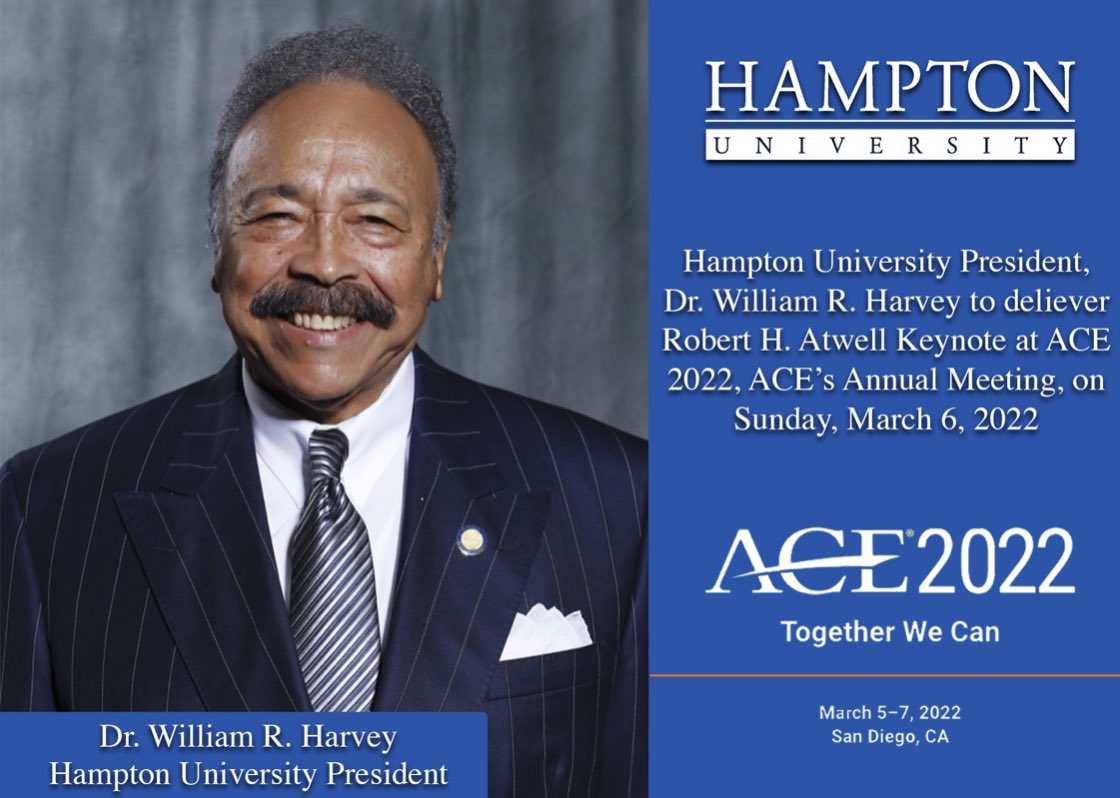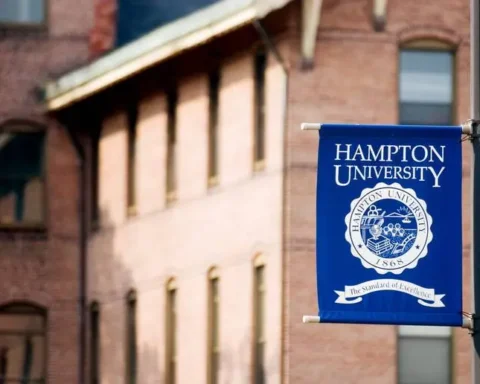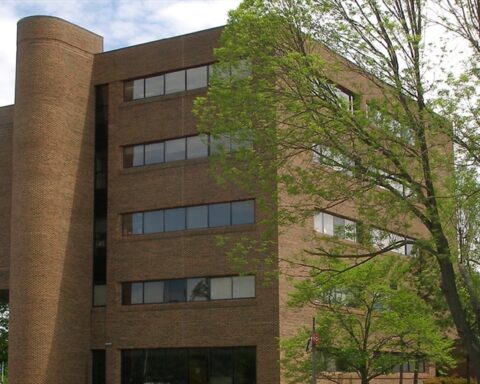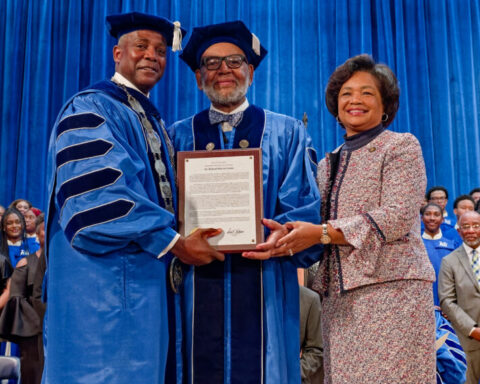By Hampton University
Hampton University President Dr. William R. Harvey delivered the Robert H. Atwell keynote address to the 1,500 executives in attendance at ACE 2022, the American Council on Education’s (ACE) Annual Meeting on Sunday, March 6. During his impassioned speech, which received multiple ovations from the audience, Dr. Harvey conveyed what his more than 50 years in higher education and business have taught him about being a successful leader.
Dr. Harvey began his keynote address to the audience at ACE 2022 by describing how at the age of 36, a young first-time president created a vision of what he wanted for an institution that was in disrepair at the time of his appointment. Now, more than four decades later, he has blazed a legendary career in higher education and transformed the institution into a world-class leader in higher education.
“I believe in openness, transparency and the value of input from all constituent groups,” said Dr. Harvey. “From the beginning of my presidency, 44 years ago, I initiated monthly meetings with student leaders and the entire faculty. Before the pandemic, I also initiated meetings with local and regional chapters of the National Hampton Alumni Association. There are also periodic meetings held with all staff personnel. At all of these meetings, I begin by providing current and relevant information to the participants. After that, I open it up to unscripted questions from the body. The questions, comments and input have provided my team and me with an invaluable tool to assist in our strategic planning.”
Dr. Harvey spoke to the successes of Hampton University that haven come during his tenure and the overall importance of his team. “Many people ask what has led to Hampton’s success. In my opinion, leadership is the main ingredient in the success of any entity. No matter the field, whether it is business, education, government, politics, organized crime, sports, the arts, healthcare, etc., leadership makes a difference. It could make a positive difference such as building or reviving a great corporation or university. It also could make a negative difference such as building or controlling the drug trade in a particular city or locality. Either way, success is defined by effective leadership. That leadership at Hampton came from the extraordinary talent of the individuals who have been a part of my team for 44 years.
Based on the theme of leadership, his remarks pay homage to the first example of effective leadership, his mother and father. “I have been fortunate in my life in many regards, and that includes having a mother and father who were my first leadership role models,” said Dr. Harvey. “The lessons that I learned from them directly started me on the road toward my own leadership development. By his example, Daddy taught me, among other things, leadership lessons of listening, asking questions, seeking input, and analyzing information received. By her example, among other things, Mother taught me fiscal responsibility and the understanding that in order for a leader to lead others, he or she has to have personal qualities about themselves that inspire other to follow. Those personal qualities include the character traits of truth, trust, respect for yourself, respect for others, and responsible personal relations. Both my mother and daddy constantly emphasized the importance of helping others. I took my parents’ lessons to heart, and it is upon those foundational lessons that I built my own leadership model, which I have practiced during my 44 years as President of Hampton University.”
As he continued, Dr. Harvey expressed to the audience the importance of his professional playbook which includes: emphasizing the team approach; pushing for high quality academics, promoting character development; creating an exciting vision; securing support from a diverse number of individuals; encouraging a strong work ethic; inspiring innovative aggressiveness by the faculty; employing good management practices; taking risks when necessary; promoting a culture of fairness; providing support and help to others when possible; exercising fiscal conservatism; and concentrating on results.
“I often tell my team that collective competence is better than individual competence, any day,” said Dr. Harvey. “Therefore, utilizing the talents, energy, efforts, and experience of the members of the team is essential because an organization can only be as successful as the team of individuals that oversees its day-to-day operations. Nine times out of ten, the training, experience, and wisdom of a group of people will go much farther and be more productive than that of a single individual. No matter how talented an individual may be, better results are achieved when a team of talented people who work together for a common good.”
Some of the accomplishments that Dr. Harvey spotlighted ranged from establishing the Hampton University Proton Therapy Institute, creating the Department of Atmospheric & Planetary Sciences, receiving the U.S. Department of Education grant to create the Virginia Workforce innovation and Entrepreneurship Center, and interacting with the over 38,000 students who have graduated during Dr. Harvey’ s presidency.
“I consider the establishment of the Hampton University Proton Therapy Institute a major highlight of my career,” said Dr. Harvey. “This life-saving cancer treatment center is treating patients who have prostate, breast, lung, ocular, pediatric, head, neck, and brain cancers. As clear as the need was for Virginia and the Mid-Atlantic States to have this kind of healing power, it became just as clear that the data and ancillary information was too overwhelming for one person. I knew that help was needed and that many challenges would lie ahead. In that regard, I asked Dr. Cynthia Keppel a trained physicist and cancer researcher to assist me in this effort. I will say that without her help, the Center would never have become a reality. The above-mentioned are but a few of the many successes that Hampton has experienced. All of them came into fruition because of my team and the team approach. There is absolutely no way that Hampton could have had the successes we have had without the team.”
“In discussing success at Hampton, I must mention that over 38,000 students have graduated from our marvelous institution since I have been president. I am extremely proud of their success and service literally all over the world.”
In the conclusion of his address, Dr. Harvey charged the assembled academic leadership of the 1700 colleges and universities that make up ACE to use their respective positions at their institutions to build bridges, unite individuals and do what’s in the best interest of the people instead of pushing a political agenda.
“Throughout my entire presidency, I have always tried to do what is right and best. Doing what is right and best seems like it should be simple, but it is not, as evidenced by all of the divisiveness in our country,” said Dr. Harvey. “America was built on diverse views. Unfortunately, our society is polarized more today than ever before. This polarization, fueled by the partisan divide between politicians, some in the media, as well as some of us in the higher education enterprise, has produced the highest levels of incivility that the country has ever witnessed. I urge you to help shrink the divide by positively leading, guiding, and directing, instead acquiescing to every partisan point of view. We need to pull together. There is a way to disagree without being disagreeable. We should try to unite people across political, racial, social, and other divides. I challenge each of you here not to contribute to the incivility in our nation. Instead, focus on being of service to our nation and to the higher education community.”
“With members from over 1700 colleges and universities, ACE is the perfect organization to lead an effort to reduce some of the incivility in this nation. As educators, we have a responsibility to contribute to making America and the world a better place. Through research and service, our institutions can address issues such as health disparities, gun violence, poverty, social and racial injustices, gender biases, climate and other environmental concerns, energy conservation and other major problems that we face.”





